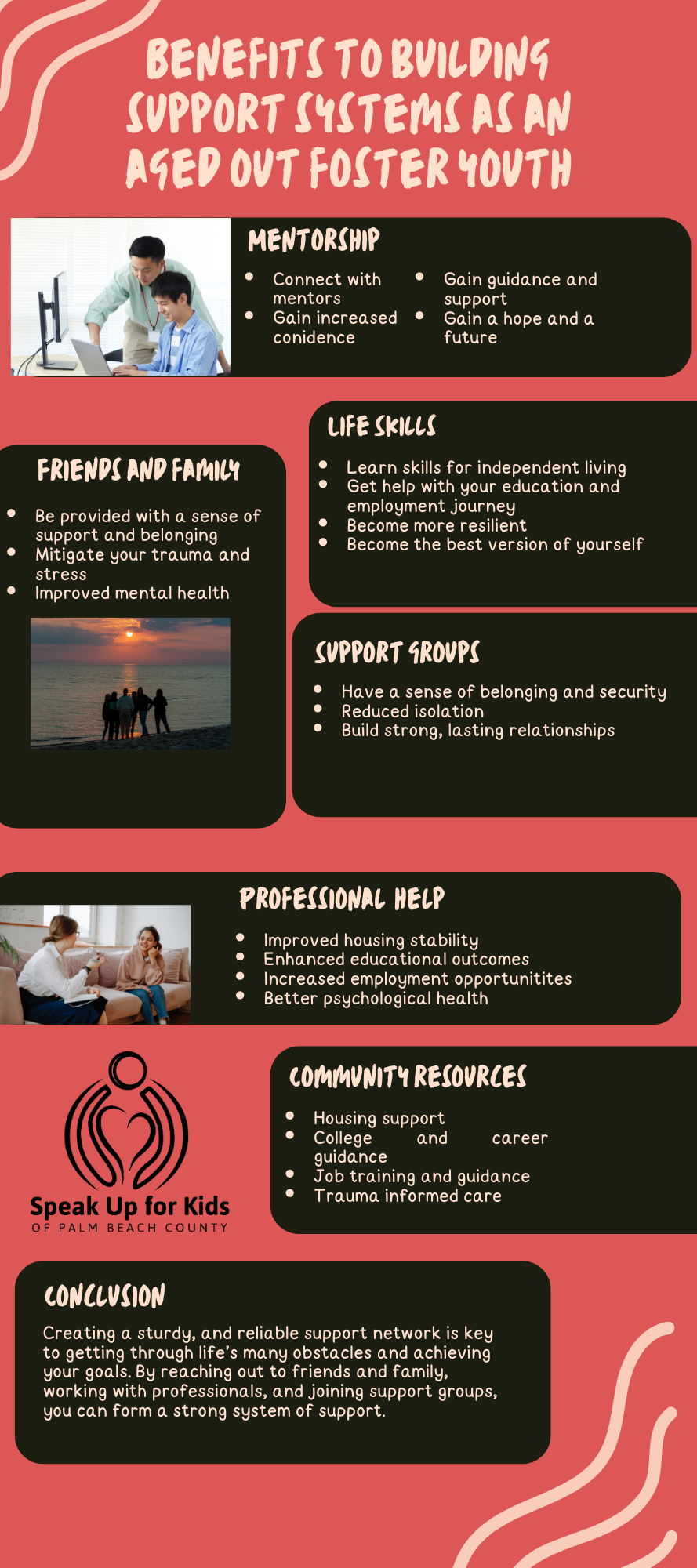Finding Support
Contributed by Speak Up for Kids Student Intern Team — This article was developed through the combined efforts of multiple student interns, each bringing unique skills and perspectives to support life skills education for foster youth.
Overview
Finding support is crucial for navigating life’s challenges, especially when transitioning out of foster care or facing significant life changes. A strong support network can provide emotional backing, practical help, and guidance, helping you build a stable and fulfilling life. This article explores various ways to find and build your support system.
Types of Support
Emotional Support: This involves having people who listen, empathize, and provide encouragement. Emotional support helps you cope with stress, build resilience, and maintain mental well-being.
Practical Support: This includes assistance with daily tasks, such as finding housing, securing employment, or managing finances. Practical support can also involve help with navigating services and resources.
Informational Support: Receiving advice, guidance, and knowledge from individuals or organizations. This can include career counseling, academic advising, or legal advice.
Social Support: Building relationships and connections with others through social activities and networks. Social support helps reduce feelings of isolation and fosters a sense of community.
How to Find Support
Reach Out to Friends and Family: Don’t hesitate to ask for help from people you trust. Friends and family can provide emotional support and practical assistance when needed. Maintaining these connections can be invaluable in times of need.
Engage with Mentorship Programs: Many organizations offer mentorship programs for individuals transitioning out of foster care or facing life transitions. Mentors can provide guidance, support, and a positive role model.
Join Support Groups: Look for local or online support groups that address your specific needs or challenges. Support groups offer a sense of community and understanding from individuals with similar experiences.
Utilize Community Resources: Explore resources available in your community, such as non-profit organizations, community centers, and local services. Many of these resources offer support for housing, employment, education, and more.
Seek Professional Help: Mental health professionals, such as counselors and therapists, can offer support for emotional and psychological challenges. They can provide coping strategies, therapy, and support to help you manage stress and improve your well-being.
Participate in Educational and Vocational Programs: Engage with programs that offer skills training, job placement, or academic support. These programs can provide practical assistance and connect you with additional resources.
Network with Peers: Connect with others who are in similar situations or who have experienced similar challenges. Peer support can be incredibly valuable for sharing advice and building a sense of camaraderie.
Building Your Support System
Be Proactive: Take the initiative to seek out and build relationships with people and organizations that can offer support. Don’t wait for help to come to you; actively seek out resources and connections.
Cultivate Relationships: Invest time and effort in nurturing your relationships with those who support you. Strong, positive relationships can provide ongoing support and stability.
Communicate Openly: Be honest and open about your needs and challenges. Effective communication can help others understand how they can best support you and foster stronger connections.
Set Boundaries: While seeking support, it’s important to set healthy boundaries. Protect your well-being by ensuring that your support network respects your personal space and limits.
Give Back: Support is a two-way street. As you receive help, consider ways to support others in return. Giving back can strengthen your connections and build a sense of community.
Final Thoughts
Finding and building a strong support network is essential for navigating life’s challenges and achieving your goals. By reaching out to friends and family, engaging with mentorship programs, joining support groups, and utilizing community resources, you can create a robust system of support. Remember, seeking support is a sign of strength, and building meaningful connections will provide you with the foundation needed for a successful and fulfilling life.


